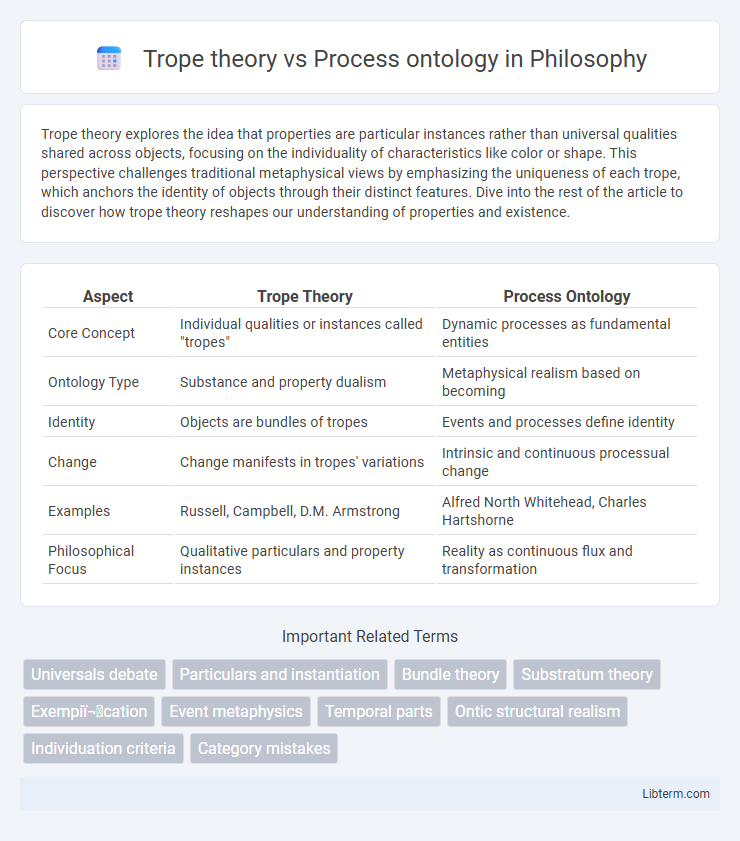Trope theory explores the idea that properties are particular instances rather than universal qualities shared across objects, focusing on the individuality of characteristics like color or shape. This perspective challenges traditional metaphysical views by emphasizing the uniqueness of each trope, which anchors the identity of objects through their distinct features. Dive into the rest of the article to discover how trope theory reshapes our understanding of properties and existence.
Table of Comparison
| Aspect | Trope Theory | Process Ontology |
|---|---|---|
| Core Concept | Individual qualities or instances called "tropes" | Dynamic processes as fundamental entities |
| Ontology Type | Substance and property dualism | Metaphysical realism based on becoming |
| Identity | Objects are bundles of tropes | Events and processes define identity |
| Change | Change manifests in tropes' variations | Intrinsic and continuous processual change |
| Examples | Russell, Campbell, D.M. Armstrong | Alfred North Whitehead, Charles Hartshorne |
| Philosophical Focus | Qualitative particulars and property instances | Reality as continuous flux and transformation |
Introduction to Trope Theory and Process Ontology
Trope theory posits that properties are particularized instances, known as tropes, which are the fundamental building blocks of reality rather than universals. Process ontology emphasizes processes and events as primary entities, viewing existence as a dynamic flow rather than static objects. Both frameworks challenge substance metaphysics by prioritizing change and individuality over fixed essences.
Historical Background and Philosophical Roots
Trope theory traces its origins to the early 20th century, notably influenced by C. D. Broad and G. E. Moore, emphasizing particularized properties as fundamental units of reality. Process ontology, with roots in Alfred North Whitehead's metaphysics, views reality as constituted by dynamic processes rather than static substances, challenging traditional substance-based frameworks. Both frameworks reflect a shift from classical metaphysics, with trope theory focusing on property particulars and process ontology prioritizing events and becoming.
Core Principles of Trope Theory
Trope theory centers on the idea that objects are bundles of particularized properties called tropes, which are specific instances of qualities unique to each object. Unlike process ontology, which emphasizes events and processes as the fundamental constituents of reality, trope theory insists on discrete, abstract particulars as the core units of existence. Central principles of trope theory include the rejection of universals in favor of individual tropes and the bundling of these tropes to form objects with distinct identities.
Fundamental Concepts in Process Ontology
Process ontology centers on dynamic becoming and events as fundamental units, contrasting with trope theory's static particularized properties. Fundamental concepts in process ontology include processes, activities, and interactions that constitute reality in a continual state of flux. This framework emphasizes temporal development and relationality over fixed substances or discrete qualities.
Comparative Analysis: Entities vs. Processes
Trope theory centers on particularized entities called tropes, which are the fundamental units of reality representing specific properties or qualities that individual objects instantiate. In contrast, process ontology prioritizes dynamic processes and events as the primary constituents of existence, emphasizing change and becoming over static substances. This comparative analysis highlights that trope theory views reality as composed of discrete, concrete particulars, whereas process ontology envisions it as an interconnected flow of processes, challenging traditional substance-based metaphysics.
Trope Theory’s Approach to Properties and Particulars
Trope theory posits that properties are particularized instances called tropes, which exist only as components of individual objects rather than as universals shared across multiple entities. Each trope is a unique, concrete entity that accounts for the specific qualities of an individual, contrasting with process ontology's emphasis on dynamic processes and events as fundamental constituents of reality. This approach allows trope theory to explain the individuality of properties without invoking abstract universals, grounding them directly within particulars.
Process Ontology’s View on Change and Continuity
Process ontology emphasizes that reality is fundamentally constituted by dynamic events and processes rather than static substances, highlighting continuous becoming and transformation as core features of existence. Change is not an external modification of enduring entities but intrinsic to the processual nature of being, where continuity arises from patterns of activity rather than unchanging substances. This contrasts with trope theory's view of discrete property instances, as process ontology views stability as emergent from ongoing flux within interconnected processes.
Strengths and Criticisms of Trope Theory
Trope theory excels in providing a precise account of particularized properties by treating them as individual instances, which enhances its ability to explain property change and the identity of objects over time. Critics argue that trope theory struggles with the problem of resemblance, as it must explain the similarity between tropes without appealing to abstract universals, leading to concerns about infinite regress or circularity. Its strength lies in ontological parsimony, yet it faces challenges in adequately accounting for shared properties and the structure of reality compared to process ontology, which emphasizes dynamic relations and processes over static entities.
Challenges and Advantages of Process Ontology
Process ontology emphasizes becoming and change, addressing challenges in capturing dynamic phenomena overlooked by trope theory's static properties. It offers advantages in modeling complex systems' evolution and interrelations, enabling richer semantic representation and improved explanatory power. However, process ontology faces challenges in formalization and integration with established frameworks due to its abstract, fluid nature.
Contemporary Debates and Future Directions
Trope theory challenges substance-based metaphysics by positing that properties are particularized instances, making it central in debates over universals and identity in contemporary metaphysics. Process ontology emphasizes events and changes as fundamental, offering a dynamic alternative to static substance views and influencing fields such as ontology, physics, and cognitive science. Future directions in these debates explore integrating trope-based particulars with processual frameworks to reconcile persistence, change, and relational structure in modeling reality.
Trope theory Infographic

 libterm.com
libterm.com